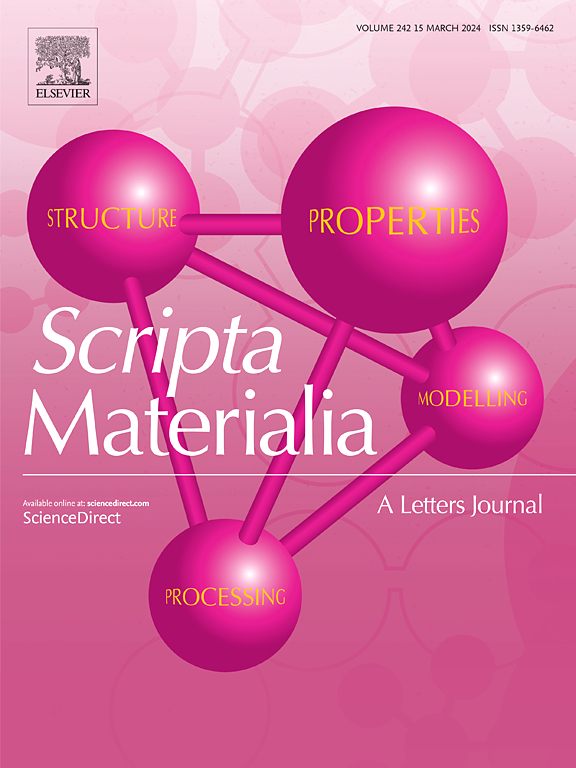无需热处理即可实现氢化物分解
IF 5.6
2区 材料科学
Q2 MATERIALS SCIENCE, MULTIDISCIPLINARY
引用次数: 0
摘要
对于抗氢脆或潜在的氢储存,控制氢化物是HCP金属的关键。传统的氢化物分解方法依赖于高温热过程,这可能会损害材料的完整性。本文提出了一种在室温下通过表面驱动反应分解氢化物并提取氢的电化学过程。本研究以Ti-6Al-4V合金为模型体系,表明该方法在不降低微观组织和力学性能的情况下有效地去除了氢化物,拉伸性能完全恢复到接收状态。此外,处理后未观察到氢化物重整,证实了氢的有效脱除。与热分解相比,这种电化学过程具有明显的优势,包括温和的操作条件,可扩展的设计,通过施加电压按需控制,以及与可再生能源的兼容性。这些特性扩展了其潜力,使其能够集成到分布式储氢和能源系统中。本文章由计算机程序翻译,如有差异,请以英文原文为准。

Enabling hydride decomposition without heat treatments
For hydrogen embrittlement resistance or, potentially, for hydrogen storage, controlling hydrides is the key in HCP metals. Conventional approach for hydride decomposition relies on high-temperature thermal processes that may compromise material integrity. We present here an electrochemical process which can decompose hydrides and extract hydrogen at room temperature via surface-driven reactions. Using Ti-6Al-4V alloy as a model system, this study demonstrates that this method effectively removes hydrides without degrading the microstructure or mechanical properties, with tensile properties fully recovered to the as received state. Furthermore, no hydride reformation was observed after treatment, confirming efficient hydrogen removal. Compared to thermal decomposition, this electrochemical process offers distinct advantages, including mild operating conditions, scalable design, on-demand control via applied voltage, and compatibility with renewable energy sources. These features extend its potential beyond hydrogen embrittlement mitigation, enabling integration into distributed hydrogen storage and energy systems.
求助全文
通过发布文献求助,成功后即可免费获取论文全文。
去求助
来源期刊

Scripta Materialia
工程技术-材料科学:综合
CiteScore
11.40
自引率
5.00%
发文量
581
审稿时长
34 days
期刊介绍:
Scripta Materialia is a LETTERS journal of Acta Materialia, providing a forum for the rapid publication of short communications on the relationship between the structure and the properties of inorganic materials. The emphasis is on originality rather than incremental research. Short reports on the development of materials with novel or substantially improved properties are also welcomed. Emphasis is on either the functional or mechanical behavior of metals, ceramics and semiconductors at all length scales.
 求助内容:
求助内容: 应助结果提醒方式:
应助结果提醒方式:


